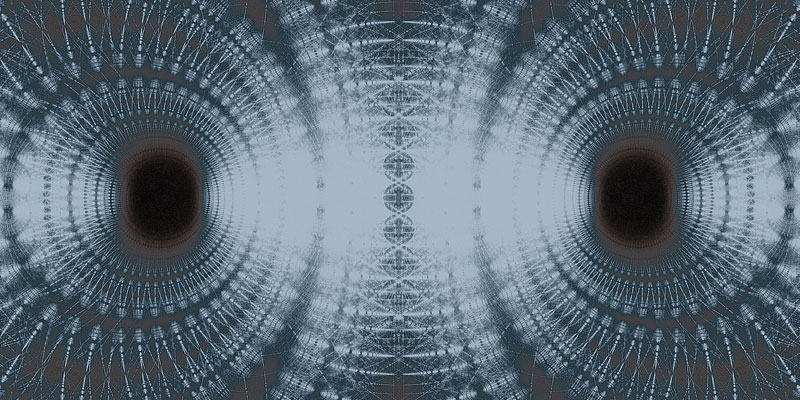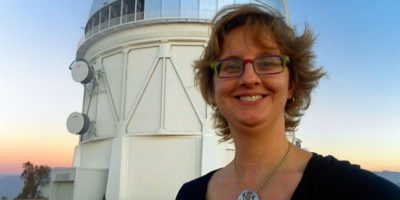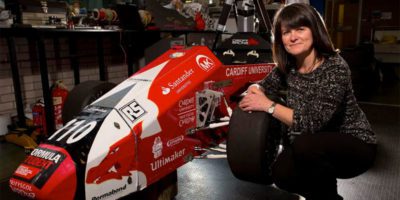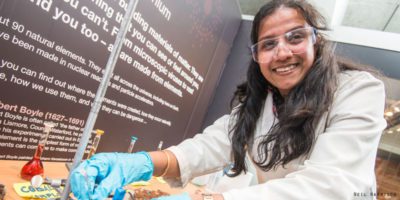Rebecca Douglas is a Ph.D. student in the Institute for Gravitational Research at the University of Glasgow. In addition to speaking at Soapbox Science in Glasgow, Rebecca has been coordinating the event with help and support from Dr. Paul Hoskisson, Dr. Mhairi Stewart, Professor Tracey Howe, ScienceGrrl Glasgow and the Glasgow Science Festival.
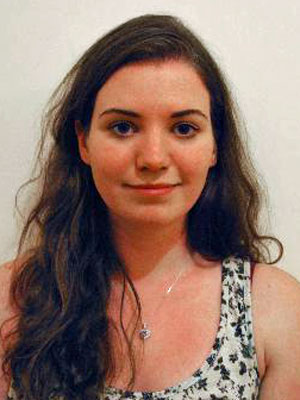
Rebecca spoke at the Glasgow Soapbox Science event, which took place on Sunday 7th June 2015. The title of her talk was: “Gravitational wave astronomy opening a new window in the universe.”
My love of physics – how things work on a fundamental level
I always loved science in school and when the science classes were separated into biology, chemistry and physics I found that all the science I loved most came under the “physics” category. I really enjoy learning how things work on a fundamental level and so it was a perfect fit. I’m now approaching the end of my Ph.D. [Doctor of Philosophy] in gravitational physics but I hope that I will be able to continue work as a research in this area.
Part of an international collaboration to detect the wobbles we call gravitational waves
The fabric of spacetime is curved and wobbly. Huge catastrophic events like exploding stars and colliding black holes create the wobbles which we call gravitational waves. I’m part of an international collaboration to detect the wobbles.
In particular I work on understanding materials and developing technologies for upgrades to the machines that may one day be able to make a detection. When we achieve that we’ll know a whole lot more about how things like black holes work.
Making gravitational wave detectors more sensitive
The existing gravitational wave detectors are pretty good but they need to be made more sensitive. We’re going to do this, in part, by running the next generation of detectors at low temperatures. This means checking that everything will still work at low temperature and developing new technologies where things might fail.
I mostly work with materials like sapphire and silicon, along with liquid nitrogen and liquid helium, to find out if these materials will be suitable for use in our detectors.
Huge exciting challenges that science needs to overcome – girls and women are half our problem solving potential
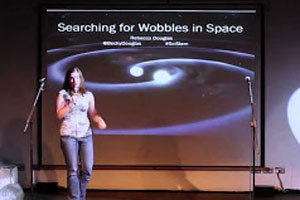
If we say science isn’t for girls and women then we immediately lose half of our problem solving potential and we really can’t afford that.
Making the culture of physics and academia work for more people, not just women
I think that physics and academia involve career paths that don’t work for a lot of people, not just women. The tendency to move from Ph.D. to a few temporary positions as a post-doctoral researcher can be very difficult, especially as this often requires moving to new institutes, countries or even continents.
It’s a lifestyle that’s often incompatible with having a partner, getting a mortgage or starting a family and while it’s fine for some people, for others it’s problematic. I think the culture is already starting to change and employers are starting to think about how this can disproportionately affect women but there’s still a long way to go.
Soapbox Science – proving there are lots of great women speakers if you’re just willing to try and find them
I was involved with running an event at the Glasgow Science Festival with Science Festival. Someone who had worked on a previous Soapbox Science event got in touch and suggested that I bring it to Scotland. I thought the format was really innovative and fun and so I agreed.
I especially liked the focus on having women speak about their research – too often I hear event organisers saying that they don’t have many (or any) women speakers because no one was available – I think the success of Soapbox proves that there are plenty of great women speakers available, if you’re just willing to try to find them.
My Soapbox Science talk
I will be talking about how to detect gravitational waves and how doing so will usher in a new era of astronomy. I’m doing lots of practise talks! Standing on a chair and talking to myself in the mirror. The only difficulty is trying to work out what kind of questions I’ll get.
In no more than three words, what to expect from my Soapbox Science session:
Wobbles in space. What more do you need to know? Come and see us for free here. Everyone is welcome.
https://twitter.com/beckydouglas
https://instagram.com/beckydouglas1/

